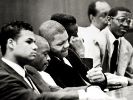Eye For Film >> Movies >> The Central Park Five (2012) Film Review
It was one of the worst miscarriages of justice in New York's history. Still, relatively few people know about it - far more remember the original crime and the trial that followed it. A lone female jogger in Central Park, raped and beaten so badly that she almost died, left with brain damage and no memory of the traumatic event. Five teenagers arrested and locked away. Talk of teenage 'wilding' sprees. Donald Trump calling for the death penalty. Altogether, over 20 years of young life wasted befoe another man confessed - with strong supporting evidence - to being the attacker.
It may be a US story but it's especially pertinent in the UK today, with concern over police corruption and a lynch mob mentality in sections of the media. It's also vital viewing for anybody likely to find themselves on a jury, as it highlights how easy it is to misunderstand evidence and fail to identify what, in retrospect, are obvious discrepancies in the evidence.

Antron, Kevin, Kharey, Raymond and Yusef were kids from the projects, kids who encountered criminality in their day to day lives but had previously never been in trouble themselves. Now adults, they look back on what happened at that time with some of the same astonishment as the viewer. Considering what they've been through, they're all remarkably well-adjusted, credible witnesses. Being young, poor, and black or Hispanic sadly meant they weren't seen as credible at trial. But what really sunk them was the fact they had confessed. This may astound some viewers. The film brings in a psychologist to explain it and the men themselves do a good job of making it make sense. They were young, frightened; they'd been in the police station for hours; they were told if they cooperated, they could go home. They were ready to say pretty much anything. What they did say contradicted known facts, but by then a narrative had developed that seemed to carry everyone helplessly along. A juror troubled by doubts found himself caught in the same tide. Over time, it wore his resistance down.
Alongside the men's testimony, the film brings in key figures from the time - journalists who contributed to the developing media narrative, lawyers, even former mayor Ed Koch. Tellingly, no-one from the NYPD agreed to participate. There's a wealth of documentary material, with newspapers and archive footage, even some of the taped confessions. All of this helps us to understand not only what happened to the boys but why, in a city which then had five murders a day, this was such a pivotal moment, such a huge event. Racist narratives are traced back to the Mississippi lynchings; the sanctity of the park is slotted into personal safety narratives that helped people to cope in an often intimidating environment; then there's Trisha Meili's perfect victim status, with her golden hair, her good job, her absolute inability to comment on her own story. To put this in context, we hear about he savage beating of a homeless man which some of the boys witnessed on the other side of he park that night, which resulted in only brief prison sentences. Then there's the boys' own case, with the city still resiting some lawsuits - they may eventually have had their names cleared but they have enjoyed very little in the way of justice.
All of this adds up to a powerful, psychologically complex portrait of a community, of a time and place when it made a strange kind of sense that five teenagers should be sacriificed to allay a city's fears, even whilst the real attacker was left free to rape again, even to kill. Multiple narratives come together in an appropriately troubling film. It's a film that everybody with an interest in justice should see.
Reviewed on: 22 Nov 2012

















